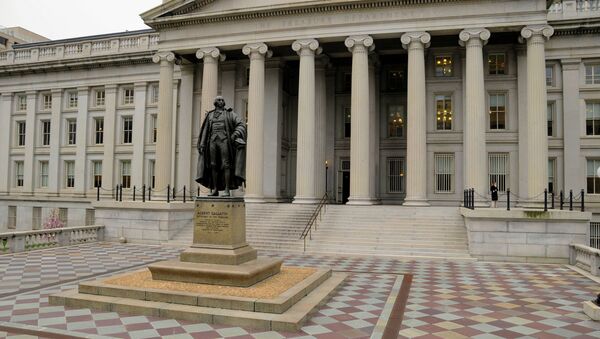Kristian Rouz — Several emerging markets, including China, Brazil, Russia and Taiwan, previously among the biggest buyers of US governmental bonds, have recently been selling them at the fastest pace since 1978. US bonds, commonly referred to as ‘Treasury notes' or ‘Treasuries' are, however, widely regarded as being among the most ‘safe haven' assets in the financial world, meaning the emerging markets must have serious reason to cash those out for the more volatile money liquidity.
The total value of traded US Treasury notes is estimated at $12.8 trln, and during the past ten years, with the notable exception of the most alarming month of 2008, international central banks had been purchasing US bonds, increasing volumes of their FX reserves. The rise of mainland China as the primary global manufacturer and the subsequent boom in commodity prices, crude oil, in particular, provided significant surpluses in the foreign trade of several of the largest emerging markets, including Brazil, Russia and, of course, China.
However, this year, according to Deutsche Bank Securities, net foreign purchases of US debt dropped into the negative territory: in July 2015, international central banks sold $123 bln worth of US bonds, whilst during the period of 2010 to 2013, foreign nations were buying an average of $200 bln worth of Treasuries per year.
The emerging market selloff in US Treasuries affected the open market on Wednesday. The benchmark 10-year Treasury note fell 10/32 in price, driving the yield up 3.5 basis points to 2.070%, suggesting greater volatility to Wall Street. The 30-year Treasuries followed a similar pattern, diving in price and so pushing the yield to just above 2%. The fall in the US debt price comes in handy just before Thursday's $13 bln Treasury auction of 30-year notes, fueling demand from private investors both in and outside of the US.
The reasons behind China's sudden selloff of US debt seem, at first glance, illogical, as dumping safer assets for the more volatile yet more liquid financial tools requires a solid justification.
According to People's Bank of China (PBOC), the weakening of the renminbi requires that the regulator buys the Chinese national currency selling dollars from its FX reserves in order to contain the renminbi's further depreciation. Now, in September only, mainland China's FX reserves fell by $43.3 bln after losing $93.9 bln the previous month. Sales of US debt make up some of these losses, however, as China struggles for competitiveness and attempts to spur growth, the PBOC might enact further accommodative measures, meaning we might soon see further sales of US debt as the Chinese regulator will need money liquidity to finance its growth stimulus efforts.
What will happen to US Treasury yields in this case? If China continues to sell US bonds, effectively mounting more upward pressure onto the yield, Wall Street volatility would be prone to rise.
However, there is enough demand for US Treasuries to prevent the yield from rising dangerously high: central banks are still able to find private buyers for US debt as many domestic and international companies are buying bonds in order to safeguard their capitalization amidst the risks of the stronger dollar, the looming disinflation, and falling overseas profits. On Wednesday, the US Treasury Department sold $21 bln worth of 10-year notes amidst the second-highest international demand ever.
China owned $1.241 trln worth of US Treasuries in late July, which is below the November 2013 record highest of $1.317 trln. Since July, the PBOC needed to finance a further $120-140 bln of its spending on accommodative policies, supporting the renminbi, meaning China's holdings of the US debt could have dropped to as low as $1.1 trln.
Russia sold $32.8 bln worth of US Treasuries, while Taiwan sold $6.8 bln. Norway, suffering from a fiscal deficit due to the low oil prices, sold $18.3 bln worth of US Treasuries. Several other central banks, on the contrary, increased their holdings of the US debt. India bought some $36.7 bln worth of US debt in the last year, whilst the US Federal Reserve is holding $2.45 trln of US debt.
Such dynamics suggest the biggest sellers of the US debt are thus hedging their fiscal risks triggered by the economic slowdown, a decline in commodity prices or shrinking surplus in foreign trade.
While the Treasuries market is still able to absorb an almost indefinite volume of one-time sales, the fact of certain emerging markets selling safe haven assets might indicate an exacerbation of the current global economic trends.
As emerging market growth falters, the developed nations will also be plagued by the almost certain disinflation, effectively halting any economic expansion and hindering any advances in the overall well-being and wealth accumulation elsewhere.






